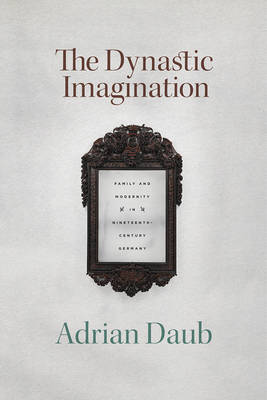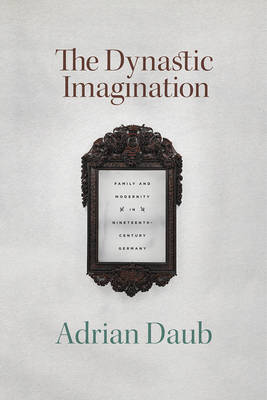
- Afhalen na 1 uur in een winkel met voorraad
- Gratis thuislevering in België vanaf € 30
- Ruim aanbod met 7 miljoen producten
- Afhalen na 1 uur in een winkel met voorraad
- Gratis thuislevering in België vanaf € 30
- Ruim aanbod met 7 miljoen producten
Zoeken
The Dynastic Imagination
Family and Modernity in Nineteenth-Century Germany
Adrian Daub
Paperback | Engels
€ 33,95
+ 67 punten
Uitvoering
Omschrijving
Adrian Daub's The Dynastic Imagination offers an unexpected account of modern German intellectual history through frameworks of family and kinship. Modernity aimed to brush off dynastic, hierarchical authority and to make society anew through the mechanisms of marriage, siblinghood, and love. It was, in other words, centered on the nuclear family. But as Daub shows, the dynastic imagination persisted, in time emerging as a critical stance by which the nuclear family's conservatism and temporal limits could be exposed. Focusing on the complex interaction between dynasties and national identity-formation in Germany, Daub shows how a lingering preoccupation with dynastic modes of explanation, legitimation, and organization suffused German literature and culture.
Daub builds this conception of dynasty in a syncretic study of literature, sciences, and the history of ideas, engaging with remnants of dynastic ideology in the work of Richard Wagner, Émile Zola, and Stefan George, and in the work of early feminists and pioneering psychoanalysts. At every stage of cultural progression, Daub reveals how the relation of dynastic to nuclear families inflected modern intellectual history.
Daub builds this conception of dynasty in a syncretic study of literature, sciences, and the history of ideas, engaging with remnants of dynastic ideology in the work of Richard Wagner, Émile Zola, and Stefan George, and in the work of early feminists and pioneering psychoanalysts. At every stage of cultural progression, Daub reveals how the relation of dynastic to nuclear families inflected modern intellectual history.
Specificaties
Betrokkenen
- Auteur(s):
- Uitgeverij:
Inhoud
- Aantal bladzijden:
- 256
- Taal:
- Engels
Eigenschappen
- Productcode (EAN):
- 9780226737874
- Verschijningsdatum:
- 29/01/2021
- Uitvoering:
- Paperback
- Formaat:
- Trade paperback (VS)
- Afmetingen:
- 152 mm x 229 mm
- Gewicht:
- 353 g

Alleen bij Standaard Boekhandel
+ 67 punten op je klantenkaart van Standaard Boekhandel
Beoordelingen
We publiceren alleen reviews die voldoen aan de voorwaarden voor reviews. Bekijk onze voorwaarden voor reviews.











